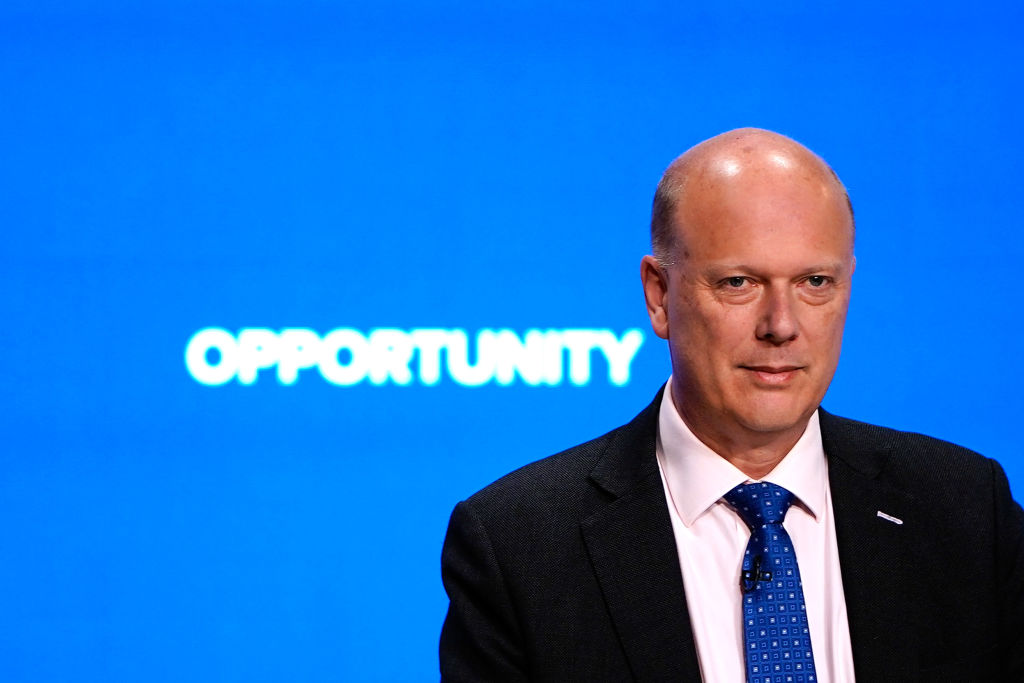Chris Grayling is back in the news – and once again it is for all the wrong reasons. The transport secretary is facing calls to quit over his handling of the Brexit ferry debacle, which led to the Government having to shell out £33m of taxpayers’ money to Eurotunnel. Grayling said ‘however regrettable the Eurotunnel court action was, we had to take a decision to protect the interests of the country in the circumstances of a no deal Brexit’. So who is to blame? The whole Cabinet, according to Grayling, who insisted the decision that led to the payout was taken collectively.
Of course, this is far from the first time the hapless Grayling has found himself in hot water. Here is Mr S’s potted history of Grayling’s failings: The cyclist mishap:Blundering Chris Grayling sent a cyclist flying after opening his ministerial car door outside Parliament. The Transport Secretary was filmed helping the rider to his feet following the incident in December 2016. But despite Grayling’s efforts to rectify things, the cyclist involved said he was angry at Grayling after he accused him of cycling too fast, the Guardian reported.
Grayling vs cyclists: round two
Grayling’s relations with cyclists went from bad to worse when he claimed that cyclists do not count as road users. Grayling told Parliament:
“Where you have cycle lanes, cyclists are the users of cycle lanes…And there’s a road alongside – motorists are the road users, the users of the roads. It’s fairly straightforward, to be honest.”
Former Tour de France cyclist Chris Boardman accused Grayling of an ‘astonishing lack of knowledge’ about cyclists.The gay B&B row:
Grayling was forced to apologise back in 2010 for saying that B&B owners should have the right to turn away gay guests. The shadow home secretary’s colleagues turned on Grayling, with one shadow minister telling the Guardian that ‘Chris Grayling is just not up to the job’.
The book ban:
A book ban on prisoners, introduced by Grayling in 2013, was one of his most unpopular moves. The former justice secretary’s decision to stop friends and families from sending books to inmates was later ruled to be unlawful by the High Court.
The court charge fiasco:
Grayling’s decision to introduce charges for those pleading guilty in court led to the resignation of more than 100 magistrates. The fees – £150 for those entering a guilty plea in a magistrates’ court, or £1200 for those found guilty at a crown court – were criticised for apparently encouraging innocent people to plead guilty. Michael Gove binned the charges when he took over from Grayling, saying that the ‘intent has fallen short’.
The Moss Side controversy:
Grayling did his best to alienate people in Manchester by comparing the city’s Moss Side area to The Wire, a drama series about American drug dealers. His opposite number, the home secretary Alan Johnson, accused Grayling of ‘talking Britain down’.
The disappearing act:
Train travellers were in uproar when season ticket costs rose sharply at the beginning of this year. But while miserable commuters waited on cold platforms for overpriced and delayed trains, Grayling made himself scarce – by jetting off to the sunny Gulf. Grayling said that he wished the fare rise ’wasn’t as high as it is’ but he insisted he was busy ‘trying to win jobs for Britain’ in Qatar.
The rail row: In a report released in December, the Transport Secretary was blamed for the timetable chaos that caused misery for thousands of commuters over the summer. While Grayling earlier claimed that he did not ‘run the railways’, the transport committee concluded that Grayling should have taken charge. Unsurprisingly, Grayling ignored calls for him to step aside.The un-announcement act:
Admittedly not all blunders involving Chris Grayling are actually his fault. The Tory MP found himself the butt of jokes when a tweet from Tory HQ named Grayling as the party’s new chairman in a reshuffle back in January. Unfortunately for Grayling, the tweet was deleted within seconds and the job handed to Brandon Lewis instead 15 minutes later.







Comments